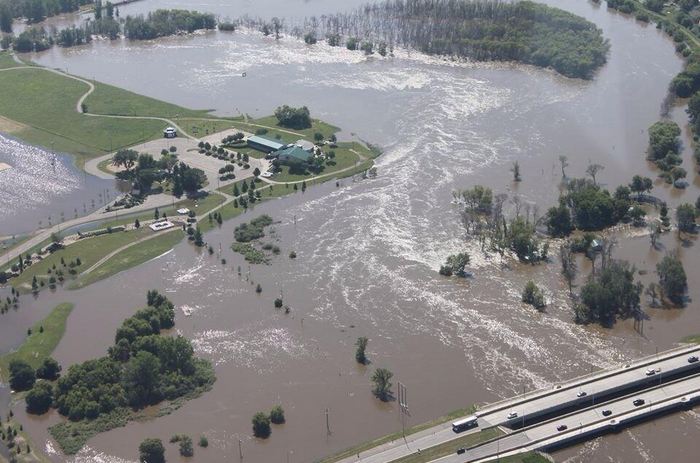Breaking
Water rising on Assiniboine River as ‘very significant crest’ hits Manitoba

Robyn Verindon tweeted, “my hometown Brandon Manitoba :/ #mothernature #manitobaflood”
WINNIPEG — Flood fears eased in Manitoba’s second-largest city Monday as emergency officials turned their attention to smaller rural communities downstream.
The swollen Assiniboine River was dropping from its crest in Brandon as dikes and other protection measures held back the water.
The high water was headed east to areas around Portage la Prairie, where more than 500 soldiers had been sandbagging properties since Saturday.
“We’re into a very critical 72 hours. We’re mobilizing every resource we have available to deal with a huge surge of water that’s coming,” said Steve Ashton, the province’s emergency measures minister.
Some 770 residents had been evacuated as of Monday, the vast majority as a precaution in case roads became impassable or there was a sudden breach of a dike.
The summer flood was caused by torrential rain at the end of June that fell on ground that was already saturated by a wet spring. Manitoba Premier Greg Selinger declared a state of emergency last Friday.
The Assiniboine was expected to crest near Portage la Prairie by Wednesday morning at a level very close to the combined capacity of the river and the Portage diversion — a channel that drains water from the river to Lake Manitoba.
Because the river and diversion channel will be pushed to their limits, crews were working to reinforce dikes on the shoreline.
A mandatory evacuation order was issued for 16 permanent homes and more than 100 seasonal cottages at Delta Beach on the south end of Lake Manitoba, where the Portage diversion empties into the lake.
If the water levels are higher than expected, the province has a last resort plan that would involve making a controlled break in the Assiniboine at the Hoop and Holler Bend southeast of Portage la Prairie.
Such a move would flood up to 150 properties in the rural area.
But some Delta Beach residents were ignoring the evacuation order Monday, saying they will stay put for now.
“Right now it’s a threat, not a real need,” said Andy Fletcher, who has a permanent home at the beach.
He wants to wait and see what happens with the Portage Diversion.
“We don’t know how much water is going to come into this marsh from the diversion, but at this point, we can just monitor and try and determine from that just how quickly we need to react. It’s not reaction time yet.”
Despite the worry, there were signs of optimism Monday.
With soldiers and volunteers filling 100,000 sandbags a day, the province was expecting to have bags in place around all threatened homes by the time the river was to crest.
Still, there was “a lot of anxiety” in the area, according to Roland Rasmussen, the reeve of the rural municipality of Cartier, downstream from Portage la Prairie.
“You just have to prepare for anything,” he said.
In Saskatchewan, emergency officials said Monday the situation was stabilizing and record high water levels on some lakes were starting to drop.
Patrick Boyle with the provincial Water Security Agency said the water is going down, but will remain above normal for the rest of the summer.
The southeastern part of the province was especially hard hit Saturday night when cottages on Crooked Lake were battered by trees and waves whipped up by a fierce storm.
Waves more than a metre high washed some cabins completely away.
The province announced Monday it will open six flood recovery centres in areas hardest hit by a deluge. The communities include Carnduff, Moosomin, Grenfell, Esterhazy, Balcarres and Yorkton.





















